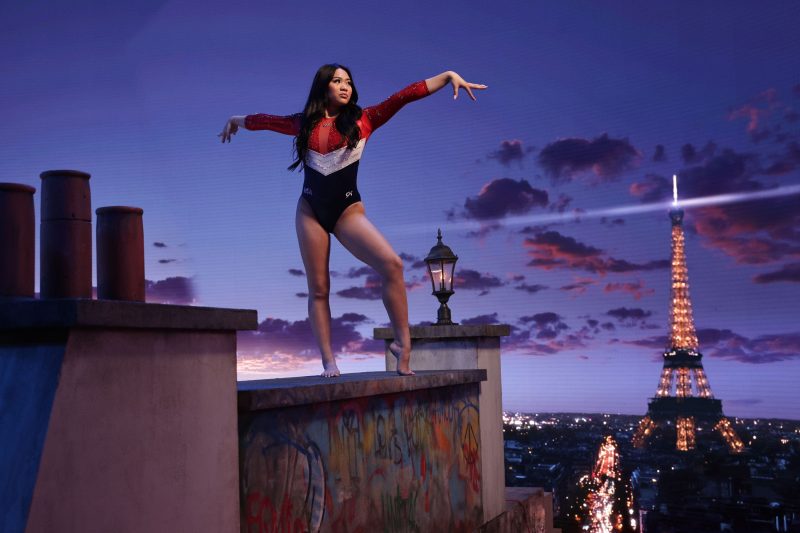UNIVERSAL CITY, California – The Eiffel Tower stood in full view when U.S. Olympic hopefuls recently sprang into action.
A skateboarder flipped his board in mid-air, a gymnast turned an aerial cartwheel and a sport climber hung one-handed from an implement – all amid iconic images of Paris, site of the Summer Olympics set to start in July.
Never mind the athletes were more than 5,500 miles from France’s famed capital.
NBCUniversal, which will televise the Olympics, brought Paris to the Los Angeles area − virtually, that is.
You see, that wasn’t the real Eiffel Tower. Or the actual Seine River. Or genuine Paris rooftops and streets. It was the work of Industrial Light & Magic (ILM), the division of Lucasfilm that handles special effects for entertainment like the TV show The Mandalorian, part of the Star Wars franchise.
What were very real: the athletes.
NBCUniversal invited 60 of them to a Universal Studios lot to create content that will be used during the run-up to and during the Games. The network already has begun rolling out video on social media featuring athletes such as climber Brooke Raboutou, gymnast Shilese Jones and breakdancer Sunny Choi.
‘Paris is quite simply a rock star in itself,’ said Jenny Storms, Chief Marketing Officer for Entertainment and Sports at NBCUniversal, ‘and very much will continue to be a prominent part of our promotion and our marketing.’
Virtual Paris got diver ‘hyped up’
Storms said the concept behind the project was no whim.
‘When we go into any Olympics, the largest driver of consumption are the athletes,’ she said. ‘Their stories, who they are and just the American public connecting with them.
‘But for the first time in a while, there is also another enormous driver that’s coming through in our research and our insights over the past year, which is our host city.’
The project began about eight months ago, when NBC contacted ILM and shared its vision. Over the spring, the special effects gurus broke down the problems and shared solutions, according to Ian Milham, the ILM Virtual Production Supervisor who oversaw the project.
In July, NBC green-lit the project.
ILM trucked in equipment from its headquarters in San Francisco in time to assemble the stage by Nov. 16, when the athletes rolled into town. Those images, gathered during a trip to Paris, were projected onto a screen 20 feet high and 50 feet wide.
‘It was super cool,’ said Tyler Downs, a diver who competed at the Tokyo Olympics in 2021. ‘It kind of got me hyped up and ready to complete.’
When director gave way to the athletes
Unlike the real Eiffel Tower, the virtual one could do more than lean.
ILM had the ability to move it across the stage to accommodate the athlete’s position.
The director also had use of five scenes: a fashion show runway under the Eiffel Tower, the banks of the Seine River, rooftops, the streets and a boat ride, which is how the athletes will make their entrance at the Opening Ceremony.
A director was on hand to coach the athletes – well, to a point.
‘When it came time to do their skills, the athletes got to take over and they got to take their shots,’ Milham said, recalling with amusement the performance of gymnast Fred Richard. ‘He went into a handstand early while the crew was still cleaning the set and he just held the handstand the entire time that the crew cleaned the set.’
Holding the position until the crew got out of the way, Milham said, Richard then did handstand pushups.
‘Absurd,’ Milham said with amazement, similar to what the athletes expressed upon arriving at, and performing in, virtual Paris.
